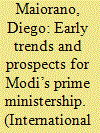| Srl | Item |
| 1 |
ID:
139616


|
|
|
|
|
| Summary/Abstract |
In May 2014 Narendra Modi became India’s Prime Minister in the wake of a historic electoral victory. He has generated two kinds of expectations: on the one hand, his voters expect him to create millions of new jobs for a fast-growing working age population; on the other hand, Hindu extremists hope that he will pursue an aggressive policy aimed at ‘hinduising’ India’s society. The first months of his premiership show that Modi is acting in both spheres, while pursuing a radical centralisation of power in his hands.
|
|
|
|
|
|
|
|
|
|
|
|
|
|
|
|
| 2 |
ID:
141079


|
|
|
|
|
| Summary/Abstract |
In 1989 India's political system underwent a process of profound change which affected the entire institutional setup of the country. Power was radically redistributed—it began to flow from the central government to the states, and from the Prime Minister's Office to the other institutions of the state. By analysing the severe institutional crisis which occurred during Mrs Gandhi's final term in office, this paper seeks to show how state institutions worked on the eve of such a redrawing of India's institutional setup. In addition, an effort is made to link the working of India's institutions to the configuration of the party system, thus stressing the importance of political dynamics in the functioning of parliamentary democracies.
|
|
|
|
|
|
|
|
|
|
|
|
|
|
|
|
| 3 |
ID:
112109


|
|
|
|
|
| Publication |
2012.
|
| Summary/Abstract |
This article examines the impact that national economic policies adopted during Indira Gandhi's final term in office (1980-84) had on four "national" social groups, namely the big industrialists, the middle class, the rich peasantry, and the poor. The study argues that the Congress (I) chose the former two as its major allies, while the rich peasantry and the poor were relegated to a secondary position. In the process, the focus of India's strategy of development shifted from the agrarian to the industrial sector, and from the rural to the urban world.
|
|
|
|
|
|
|
|
|
|
|
|
|
|
|
|
| 4 |
ID:
179937


|
|
|